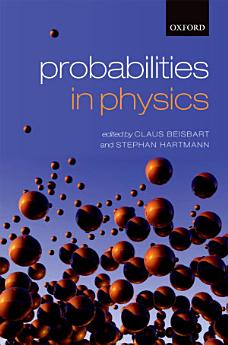Probabilities in Physics
Claus Beisbart · Stephan Hartmann
Set 2011 · Oxford University Press
E-book
464
Mga Page
family_home
Kwalipikado
info
reportHindi na-verify ang mga rating at review Matuto Pa
Tungkol sa ebook na ito
Many results of modern physics--those of quantum mechanics, for instance--come in a probabilistic guise. But what do probabilistic statements in physics mean? Are probabilities matters of objective fact and part of the furniture of the world, as objectivists think? Or do they only express ignorance or belief, as Bayesians suggest? And how are probabilistic hypotheses justified and supported by empirical evidence? Finally, what does the probabilistic nature of physics imply for our understanding of the world? This volume is the first to provide a philosophical appraisal of probabilities in all of physics. Its main aim is to make sense of probabilistic statements as they occur in the various physical theories and models and to provide a plausible epistemology and metaphysics of probabilities. The essays collected here consider statistical physics, probabilistic modelling, and quantum mechanics, and critically assess the merits and disadvantages of objectivist and subjectivist views of probabilities in these fields. In particular, the Bayesian and Humean views of probabilities and the varieties of Boltzmann's typicality approach are examined. The contributions on quantum mechanics discuss the special character of quantum correlations, the justification of the famous Born Rule, and the role of probabilities in a quantum field theoretic framework. Finally, the connections between probabilities and foundational issues in physics are explored. The Reversibility Paradox, the notion of entropy, and the ontology of quantum mechanics are discussed. Other essays consider Humean supervenience and the question whether the physical world is deterministic.
Tungkol sa may-akda
Claus Beisbart is Assistant Professor at the Technical University Dortmund (Germany). He holds a doctorate in physics (2001) and a doctorate in philosophy (2004; both from the Ludwig Maximilian University Munich). During the academic year 2008/09, he was a Visiting Fellow at the Center for Philosophy of Science at the University of Pittsburgh. His main work is in the philosophy of physics, in particular the philosophy of cosmology, in the general philosophy of science, and in ethics and social-choice theory. Stephan Hartmann is Chair of Philosophy of Science at LMU Munich, Alexander von Humboldt Professor, and Co-Director of the Munich Center for Mathematical Philosophy (MCMP). From 2007 to 2012 he worked at Tilburg University, The Netherlands, where he was Chair in Epistemology and Philosophy of Science and Director of the Tilburg Center for Logic and Philosophy of Science (TiLPS). Before moving to Tilburg, he was Professor of Philosophy in the Department of Philosophy, Logic and Scientific Method at the London School of Economics and Director of LSE's Centre for Philosophy of Natural and Social Science. His primary research and teaching areas are philosophy of science, philosophy of physics, formal epistemology, and social epistemology. Hartmann published numerous articles and the book Bayesian Epistemology (with Luc Bovens) that appeared in 2003 with Oxford University Press.
I-rate ang e-book na ito
Ipalaam sa amin ang iyong opinyon.
Impormasyon sa pagbabasa
Mga smartphone at tablet
I-install ang Google Play Books app para sa Android at iPad/iPhone. Awtomatiko itong nagsi-sync sa account mo at nagbibigay-daan sa iyong magbasa online o offline nasaan ka man.
Mga laptop at computer
Maaari kang makinig sa mga audiobook na binili sa Google Play gamit ang web browser ng iyong computer.
Mga eReader at iba pang mga device
Para magbasa tungkol sa mga e-ink device gaya ng mga Kobo eReader, kakailanganin mong mag-download ng file at ilipat ito sa iyong device. Sundin ang mga detalyadong tagubilin sa Help Center para mailipat ang mga file sa mga sinusuportahang eReader.







